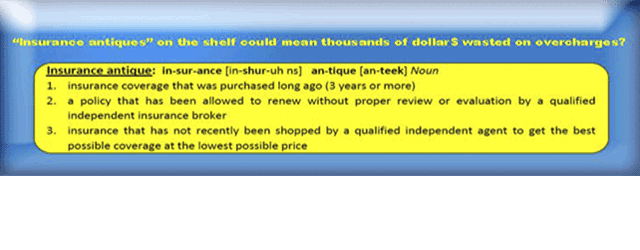As a responsible agent and an expert in association insurance, I feel compelled to educate board members on the most common mistakes made by agents when bidding association insurance. If you are not careful, you could end up purchasing a “Broken Policy” with overcharges, missing coverages and gaps that can leave you and your association and vulnerable to unnecessary liability risks and financial losses.
1. Does your policy comply with your CC&Rs?
If your current agent is not an expert in association insurance then he may never have read your association’s CC&Rs. Even if he did, he may not have understood what they dictated for coverage. There are no standard rules when it comes to associations and what is required. The only way to do it properly is to read the insurance clause of the associations CC&Rs and understand how they need to be applied as well as the coverage that they dictate the association purchase. If your association’s insurance does not properly reflect the coverage that is needed to comply with your CC&Rs, you will find out when the claim happens that you most likely have coverage gaps. This will create losses that could have and should have been covered.
Here is an example of what I am talking about:
An association’s CC&Rs dictate that the association is responsible for insuring the interiors of the units. The agent writes a policy that excludes the interiors of the units. A pipe breaks causing water leakage in a unit. The master policy denied coverage because the policy excluded the unit interiors. The unit owner then submitted the claim to his carrier and they denied it also because they said they had no responsibility to pay the claim under the association’s CC&Rs. This ended up being a claim that the association got sued over and was forced to pay out of its own pockets. You don’t want this to be you.
2. Does your policy comply with the Davis Stirling Act?
Most agents are completely unaware that the State of California has laws that govern the amount of coverage that an association must carry. If an association is not in compliance with the Davis-Stirling Act, you could be exposing all of the owners and the individual board members to potentially being sued individually in addition to the association being sued.
3. Missing Coverage
Not all contracts are the same. There are some coverages that are necessary for all associations. There are also coverages that are only necessary for certain associations and not for others. Many of these coverages will probably be meaningless to boards until they have a loss that is not covered because it is missing from their policy. It is many of these coverages that will affect the price of an insurance policy. When an association shops policies it is amazing how many of these coverages are dropped off the contract in order to create a better price. As the saying goes, “you get what you pay for.” Here are some examples of types of coverage that will be left off contracts and can come back to haunt associations later:
• Back up of Sewers and Drains – Say, for example, that unit 301 snakes its drains and the clog simply relocates down to unit 101’s plumbing and starts backing up there. The owner of 101 comes back from his three week vacation to find a foot of sewage throughout his unit. If the coverage is excluded or extremely limited, you are going to be in big trouble. This is the 2nd most common form of loss that associations have.
• Liquor Liability – If your association allows parties that serve alcohol in the common areas of your association, you need this coverage. This protects you if one of the guests leaves drunk and gets in an accident and a third party sues the association for having allowed him to leave drunk.
• Boiler and Machinery – This provides coverage for off premises electrical failures as well as the breakdown of association equipment such as elevators.
• Property manager failing to be added to the Directors and Officers coverage. Please see the “7 Stupidest Claims” article for an example of why this is important.
• Building Code and Ordinance Coverage – This provides payment for items that are not currently part of the building, but would need to be added in order to rebuild after a claim. A common example is the need to install a fire sprinkler system in your building. If you don’t have this coverage you will be paying for it out of your pocket.
These are just a few of the many types of coverage that could be missing from your contract when you are bidding on a policy.
4. Replacement Cost
One of the other common errors is evaluating the correct cost of rebuilding your building. There are two problems that could potentially occur. Your property could be under valued. If you do not have enough coverage, your insurance company may reduce the amount it pays you by the percentage that you are underinsured plus a penalty. If the property is over-insured you are going to be stuck paying for coverage that you don’t need to.
There are only two ways to beat this problem. One is to use an agreed value contract instead of a stated value contract. This shifts the burden of valuation onto the insurance company and away from you. Two is to have a very accurate Marshall & Swift replacement cost worksheet done for you annually and based on recent construction data. This way you have something to justify your valuation to the insurance company when the claim occurs.
5. Use an independent broker that specializes in condominium association insurance
You want a professional that is able to evaluate your needs and find you the right policy based upon those needs. State Farm, Farmers and Allstate agents are restricted in what they are able to sell you. They must sell their companies’ products if they have one, even if it isn’t the right policy for your needs. They have to do this because they are the company’s representative, not yours. You need to have an insurance professional to represent you. This is no different than hiring your attorney or CPA. Insurance is complicated. You need to have a trustworthy professional that will honestly compare the alternatives. Someone that will provide you with all of the alternatives and explain what the differences between the contracts are, as well as letting you know if those differences are of importance to your associations.
Our agency prides itself on being at the height of professionalism. We would be happy to review your current policy and help you understand what you have as well as what you need to properly protect your association.




